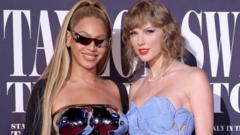The introduction of the Best African Music Performance award at the Grammy Awards is creating tensions, especially with US artist Chris Brown's nomination. Critics question the role of non-African musicians in defining African music, while supporters argue for inclusivity and cross-collaboration.
Grammy Controversy: The Definition of 'African' in Music Recognition

Grammy Controversy: The Definition of 'African' in Music Recognition
The inclusion of American artists in the Grammy's Best African Music Performance category sparks debate on authenticity and representation.
The Grammy Awards recently sparked heated discussions surrounding the eligibility of artists in their newly established Best African Music Performance category. Following the success of South Africa's Tyla, who won the inaugural award for her hit "Water," the inclusion of American R&B sensation Chris Brown for his single "Sensational" has raised eyebrows. The song features Afrobeats elements and notable Nigerian artists, Davido and Lojay, intensifying the debate over what it means to be "African" in the context of music.
With discussions around the category, Grammy CEO Harvey Mason Jr. emphasized a philosophy of inclusivity—a stance aimed at celebrating music in its many forms. He noted the importance of genre fusion, pointing to the successes seen previously with Latin music and K-Pop. However, some critics argue that the inclusion of a non-African artist undermines the purpose of the award, which aims to showcase and honor African talent.
The dominance of Afrobeats, a genre originating from Nigeria and Ghana, has also become a talking point. Nigerian journalist Ayomide Tayo posits that while Afrobeats' popularity is significant, it isn't indicative of superiority over other African genres that crave visibility. He highlights how much of Afrobeats' global clout stems from the international Nigerian diaspora, contributing to its burgeoning success in Europe and the US.
Others, including Raphael Benza from South Africa's Vth Season label, express optimism for a diverse representation of African music. Amapiano, for instance, has been gaining traction, surpassing 1.4 billion streams on Spotify, suggesting that its artists may also find recognition in future Grammy nominations.
Chris Brown's long-standing connections and growing involvement in African music—evident from his collaborations and two recent sell-out concerts in Johannesburg—complicate the narrative. Tayo’s tongue-in-cheek remark that "Chris Brown is Nigerian" speaks to the blurred lines of cultural ties and musical influence that transcend geography.
Historically, African musicians have claimed space in Grammy history before the creation of the Best African Music Performance category, with pioneering acts like South Africa's Mariam Makeba winning a Grammy as early as 1966. Over the years, other African artists found their way into major categories, highlighting a gradual shift towards recognizing the continent’s diverse musical offerings.
Many in the industry hope that the category's contentious beginning will lead to a broader exploration of African music in future Grammy ceremonies, fostering inclusivity and ultimately allowing for a wider representation of Africa's rich tapestry of genres.
With discussions around the category, Grammy CEO Harvey Mason Jr. emphasized a philosophy of inclusivity—a stance aimed at celebrating music in its many forms. He noted the importance of genre fusion, pointing to the successes seen previously with Latin music and K-Pop. However, some critics argue that the inclusion of a non-African artist undermines the purpose of the award, which aims to showcase and honor African talent.
The dominance of Afrobeats, a genre originating from Nigeria and Ghana, has also become a talking point. Nigerian journalist Ayomide Tayo posits that while Afrobeats' popularity is significant, it isn't indicative of superiority over other African genres that crave visibility. He highlights how much of Afrobeats' global clout stems from the international Nigerian diaspora, contributing to its burgeoning success in Europe and the US.
Others, including Raphael Benza from South Africa's Vth Season label, express optimism for a diverse representation of African music. Amapiano, for instance, has been gaining traction, surpassing 1.4 billion streams on Spotify, suggesting that its artists may also find recognition in future Grammy nominations.
Chris Brown's long-standing connections and growing involvement in African music—evident from his collaborations and two recent sell-out concerts in Johannesburg—complicate the narrative. Tayo’s tongue-in-cheek remark that "Chris Brown is Nigerian" speaks to the blurred lines of cultural ties and musical influence that transcend geography.
Historically, African musicians have claimed space in Grammy history before the creation of the Best African Music Performance category, with pioneering acts like South Africa's Mariam Makeba winning a Grammy as early as 1966. Over the years, other African artists found their way into major categories, highlighting a gradual shift towards recognizing the continent’s diverse musical offerings.
Many in the industry hope that the category's contentious beginning will lead to a broader exploration of African music in future Grammy ceremonies, fostering inclusivity and ultimately allowing for a wider representation of Africa's rich tapestry of genres.






















